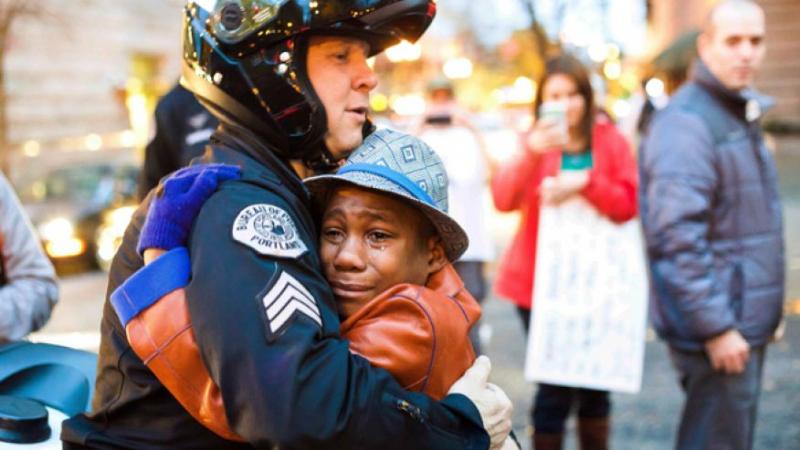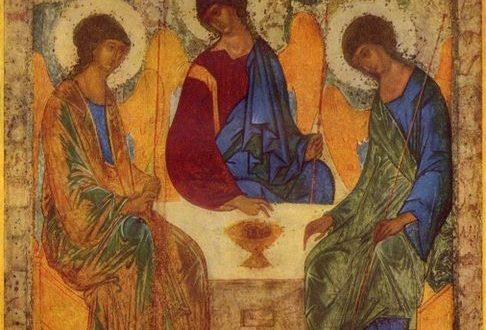
Advent/Ferguson: 5 Ways to Respond to a Dead Black Teen, Riots and Looting
“For hate is strong and mocks the song of peace on earth, good-will to men.”— Henry Wadsworth Longfellow (I Heard the Bells on Christmas Day)
Should the Ferguson Protestors Be TIME magazine’s Person of the Year? As of this writing on the magazine’s website 77% say Yes, 23% say No. It’s one more media headline that hung like a dark cloud over my Thanksgiving holiday and the launch of Christmas. Maybe yours too.
I confess I have no idea what it’s like to be Black in America. (Maybe I’ve had just a tiny taste this past year as the prejudice against people who believe in a biblical view of marriage has suddenly escalated.)
I can’t imagine what it was like to sit in a black church last Monday night, as many Americans did, and listen to the St. Louis County Prosecuting Attorney Robert McCullough announce the grand jury’s decision not to indict officer Darren Wilson in the shooting death of Michael Brown. I’ve read many of their comments and it’s just so terribly sad.
And we all wonder if the cycle of violence will ever end. For good reasons young black males attract the special vigilance of law enforcement officers. As Juan Williams documented it in the Wall Street Journal, “Murder is the No. 1 cause of death for black males between the ages of 15 and 34….More than 90% of the young black men killed by gunfire today are not killed by police but by other black men. About half of the nation's murder victims are black even though blacks account for only 13% of the U.S. population.”
We are so weary of reading the same script:
Young Black Man is killed by police.
Officer is investigated and exonerated.
Protestors gather. Riots break out.
Local businesses are burned and looted.
How might things change?
Juan Williams suggests “that all the protest groups in Ferguson stay on the case and peacefully demand justice. Then they should drive to big cities like Chicago and Baltimore. There they should hold protests against the forces feeding the racial fear of young black men among white people, black people and everyone else—the drug dealers, the gang bangers, the corrupt unions defending bad schools, and the musicians and actors who glorify criminal behavior among black men.”
First Things editor R. R. Reno adds, “This requires speaking frankly about marriage and family, the dignity of work, and the nobility of faith. It requires diligent and responsible policing to create space for a civic goodwill and trust in poor black communities.”
Ours is not the only American generation weary of violence. On Christmas Day 1864 Henry Wadsworth Longfellow was grieving the loss of his wife compounded by the news that his son, a Union soldier, was gravely wounded in the Civil War. Like millions of other Americans, Longfellow was sick to death of violence and in no mood to celebrate. He picked up his pen and the words bled out:
Then from each black accursed mouth The cannon thundered in the South,
And with the sound The carols drowned
Of peace on earth, good-will to men!
It was as if an earthquake rent the hearth-stones of a continent,
And made forlorn the households born
Of peace on earth, good-will to men!
And in despair I bowed my head, "There is no peace on earth," I said;
"For hate is strong, And mocks the song
Of peace on earth, good-will to men!"
Hate is indeed strong and mocks the song of Christmas. How might we respond?
What seems sadly lacking in today’s racial violence is the song of Christmas wrapped in the heart of a black leader like Martin Luther King. In his letter from a Birmingham Jail he wrote the following:
“The early Christians rejoiced when they were deemed worthy to suffer for what they believed. In those days the Church was not merely a thermometer that recorded the ideas and principles of popular opinion; it was a thermostat that transformed the mores of society.”
“Wherever the early Christians entered a town the power structure got disturbed and immediately sought to convict them for being 'disturbers of the peace' and 'outside agitators.' But they went on with the conviction that they were a 'colony of heaven' and had to obey God rather than man. They were small in number but big in commitment. They were too God-intoxicated to be 'astronomically intimidated.' They brought an end to such ancient evils as infanticide and gladiatorial contest. Things are different now. The contemporary Church is so often a weak, ineffectual voice with an uncertain sound. It is so often the archsupporter of the status quo. Far from being disturbed by the presence of the Church, the power structure of the average community is consoled by the Church’s silent and often vocal sanction of things as they are.”
“Just as Socrates felt that it was necessary to create a tension in the mind so that individuals could rise from the bondage of myths and half-truths to the unfettered realm of creative analysis and objective appraisal, so must we see the need for nonviolent gadflies to create the kind of tension in society that will help men rise from the dark depths of prejudice and racism to majestic heights of understanding and brotherhood.”
“I have consistently preached that nonviolence demands that the means we use must be as pure as the ends we seek. I have tried to make clear that it is wrong to use immoral means to attain moral ends. But now I must affirm that it is just as wrong, or perhaps even more so, to use moral means to preserve immoral ends.”
“Let justice roll down like waters and righteousness like a mighty stream (Amos 5:24)…Let us all hope that the dark clouds of racial prejudice will soon pass away and the deep fog of misunderstanding will be lifted from our fear-drenched communities, and in some not too distant tomorrow the radiant stars of love and brotherhood will shine over our great nation with all their scintillating beauty.”
What we can do:
Let’s pray that MLK’s spirit of boldness, purity of means and non-violence infuses the hearts of today’s black leadership and protestors.
Let’s pray that the media hand the microphone to pastors and others who might speak with this spiritual and moral authority.
Let’s ask the media…
Where are the stories of pastors who are advocating a “pure” but bold, Christ-like response to this cycle of violence?
Where are the stories of the looters caught on videotape?
Where are the stories of the black and ethnic entrepreneurs whose stores and businesses in Ferguson have been burnt down?
Let’s empathize with Black friends and express concern and prayerful support to black churches in our communities.
And as for Time magazine’s Person of the Year poll, let’s vote NO to Ferguson protestors (which would include the looters).
On November 24 FOXNews aired an exclusive video of looters breaking into Ferguson Liquor and Market featuring one looter setting fire to the store. But then one woman doused the flames with milk and soda and put out the fire, saving the store. (That part of the video has been pulled from the web, no doubt to protect her.)
If I could find her name I would write it in to Time magazine’s Person of the Year Poll. She embodies the courage and compassion of Jesus and MLK. May her tribe increase.
Then pealed the bells more loud and deep: "God is not dead; nor doth he sleep!
The Wrong shall fail, The Right prevail,
With peace on earth, good-will to men!"
What Ferguson needs is the gospel. The only response to racial violence that has resulted in deep, true reform has been inspired and empowered by Jesus’ sacrificial love and forgiveness. We’ve seen the results in America, South Africa and Rwanda. Where there is no gospel there is little enduring justice or peace.



